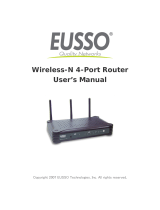
Velocity Series User Guide YML803X
2 www.netcomm.com.au
Contents
Introduction ...............................................................................................................................................................................................4
Your NetComm Velocity Series Router ..............................................................................................................................................................................5
Package Contents .....................................................................................................................................................................................................5
Key Features ..............................................................................................................................................................................................................5
Placement of your Velocity Series Router ...............................................................................................................................................6
1. Router Placement ........................................................................................................................................................................................................7
2. Avoid obstacles and interference ..................................................................................................................................................................................7
3. Cordless Phones ..........................................................................................................................................................................................................7
4. Choose the “Quietest” Channel for your Wireless Network ...........................................................................................................................................7
Product Layout ..........................................................................................................................................................................................8
Connecting and Conguring your Router ..............................................................................................................................................10
Network and System Requirements ...............................................................................................................................................................................11
Modem Requirements ....................................................................................................................................................................................................11
Connecting your Router .................................................................................................................................................................................................11
Conguring your Router .................................................................................................................................................................................................12
PC Network Adapter Setup (Windows XP) ...............................................................................................................................................................12
Setting up your Router .............................................................................................................................................................................................13
AP Router Mode – Advanced Features ..................................................................................................................................................16
Login Procedure .............................................................................................................................................................................................................17
System ...........................................................................................................................................................................................................................18
Status .....................................................................................................................................................................................................................18
LAN .........................................................................................................................................................................................................................20
DHCP ......................................................................................................................................................................................................................20
Schedule .................................................................................................................................................................................................................21
Event Log ................................................................................................................................................................................................................21
Monitor ....................................................................................................................................................................................................................22
Wizard ...........................................................................................................................................................................................................................22
Internet ..........................................................................................................................................................................................................................22
Status ......................................................................................................................................................................................................................22
Dynamic IP ..............................................................................................................................................................................................................22
Static IP ...................................................................................................................................................................................................................23
Point-to-Point over Ethernet Protocol (PPPoE) .........................................................................................................................................................23
Point-to-Point Tunneling Protocol (PPTP) .................................................................................................................................................................23
Wireless Settings ............................................................................................................................................................................................................24
Basic .......................................................................................................................................................................................................................24
WDS with AP Router ................................................................................................................................................................................................24
Advanced ................................................................................................................................................................................................................25
Security ...................................................................................................................................................................................................................25
MAC Address Filtering .............................................................................................................................................................................................27
Wi-Fi Protected Setup (WPS) ...................................................................................................................................................................................28
Client List .................................................................................................................................................................................................................28
Firewall Settings .............................................................................................................................................................................................................29
Demilitarized Zone (DMZ) .........................................................................................................................................................................................29
Denial of Service (DoS) .............................................................................................................................................................................................29
MAC Filter ................................................................................................................................................................................................................30
IP Filter ....................................................................................................................................................................................................................30
URL Filter .................................................................................................................................................................................................................31
Advanced Settings .........................................................................................................................................................................................................31
Network Address Translation (NAT) ..........................................................................................................................................................................31
Port Mapping ...........................................................................................................................................................................................................32
Port Forwarding (Virtual Server) ................................................................................................................................................................................33
Port Triggering (Special Applications) .......................................................................................................................................................................34
Application Layer Gateway (ALG) .............................................................................................................................................................................35
UPNP ......................................................................................................................................................................................................................35
Quality of Service (QoS) ...........................................................................................................................................................................................35
Routing ....................................................................................................................................................................................................................37
Tools Settings .................................................................................................................................................................................................................37
Admin ......................................................................................................................................................................................................................37
Time ........................................................................................................................................................................................................................38
DDNS ......................................................................................................................................................................................................................38
Power ......................................................................................................................................................................................................................39
Diagnosis .................................................................................................................................................................................................................39
Firmware ..................................................................................................................................................................................................................39
Back-up...................................................................................................................................................................................................................40
Reset .......................................................................................................................................................................................................................40





















